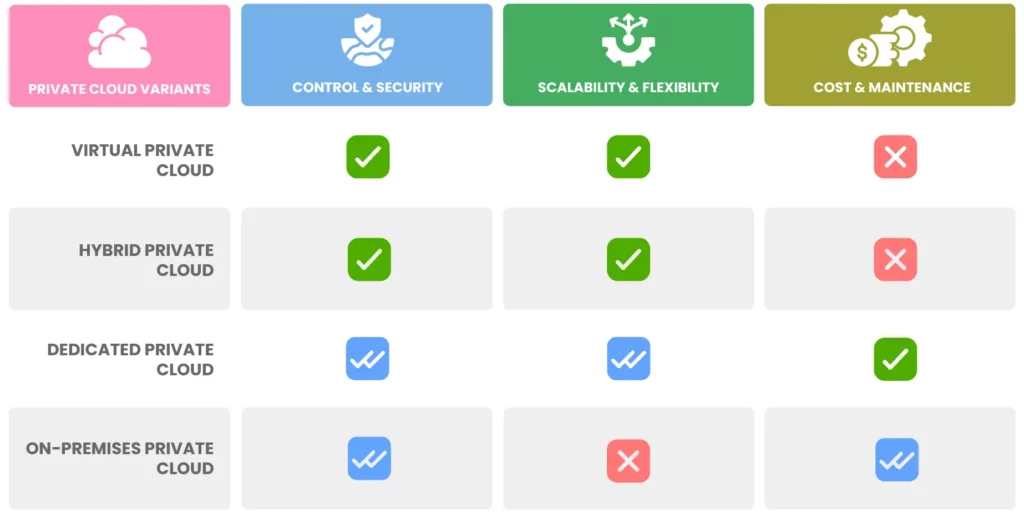In the realm of cloud computing, private clouds have emerged as a secure and tailored solution for businesses seeking control and flexibility over their data and applications. Let’s delve into the variations of private clouds and understand their unique attributes, comparing Virtual Private Clouds (VPCs), Hybrid Private Clouds, Dedicated Private Clouds, and On-Premises Private Clouds.
Virtual Private Cloud (VPC): A VPC is a cloud environment hosted within a public cloud infrastructure, offering isolated resources for a single organisation. It provides a dedicated space within a public cloud, ensuring data segregation and control while leveraging the advantages of a shared infrastructure. VPCs enable secure connectivity and scalability, ideal for businesses seeking a balance between control and cloud benefits.
Hybrid Private Cloud: Combining the best of public and private clouds, the hybrid model integrates on-premises infrastructure with public or private cloud services. It allows organisations to move workloads seamlessly between environments based on needs, ensuring flexibility, scalability, and data control. The hybrid approach caters to dynamic workloads and regulatory requirements, offering a versatile solution.
Dedicated Private Cloud: Dedicated Private Clouds provide exclusive infrastructure solely dedicated to a single organisation. This model offers enhanced security, customisation, and control over resources, ideal for mission-critical applications and sensitive data. It ensures compliance adherence and meets stringent security demands, albeit with a higher initial investment.
On-Premises Private Cloud: On-Premises Private Clouds are hosted within an organisation’s data centre, offering complete control over hardware and infrastructure. This model suits enterprises needing absolute data control, compliance adherence, and stringent security protocols. However, it requires significant upfront investments and ongoing maintenance costs.
Comparison:

Control and Security: Dedicated and On-Premises Private Clouds offer the highest level of control and security due to exclusive resource utilisation.
Scalability and Flexibility: VPCs and Hybrid Private Clouds excel in scalability and flexibility, allowing seamless expansion and workload mobility.
Read also – Private Cloud vs. Public Cloud: Choosing the Ideal Model for Your Business
Cost and Maintenance: On-Premises and Dedicated Private Clouds involve higher initial costs and maintenance, while VPCs and Hybrid Clouds offer cost-effective scalability.
Why Private Cloud for Businesses?
Data Security and Compliance: For industries handling sensitive data (such as healthcare or finance), compliance with stringent regulations is paramount. Private clouds provide greater control, enabling businesses to maintain compliance and bolster data security.
Customisation and Control: Certain businesses require specific configurations or specialised applications. Private clouds offer customisable environments, allowing tailored setups to meet unique requirements, ensuring optimal performance and resource allocation.
Performance and Reliability: Private clouds provide dedicated resources, ensuring consistent performance without concerns of noisy neighbours or resource contention. This reliability is crucial for critical applications or high-traffic workloads.
Read also – Cost-Efficiency in Private Cloud Infrastructures: Strategies and Best Practices
Flexible Workloads: Businesses with fluctuating workloads benefit from the scalability of private clouds. They can easily adjust resources based on demand without compromising security or performance.
Which Private Cloud Suits Your Business?
Small to Medium Enterprises (SMEs): SMEs seeking cost-effective solutions with enhanced control and security often opt for Virtual Private Clouds (VPCs). These offer a balance between affordability and dedicated resources.
Large Enterprises: For enterprises requiring absolute control, Dedicated Private Clouds or Hybrid Clouds are viable options. Dedicated clouds offer exclusivity, while Hybrid Clouds cater to dynamic workloads, offering scalability and data control.
Highly Regulated Industries: Industries subject to strict regulations, such as healthcare or finance, tend to favour On-Premises Private Clouds. This model provides complete control over security protocols and data management, crucial for compliance adherence.
Read also – Creating a Cloud Exit Strategy: A Guide to Cloud Repatriation
Growing Businesses: Businesses experiencing growth and anticipating scalability challenges often prefer Hybrid Clouds. They can leverage the flexibility of public clouds while maintaining critical data within a secure private cloud environment.
Choosing the ideal private cloud model involves evaluating factors like data sensitivity, compliance requirements, scalability needs, budget considerations, and long-term business objectives.
At Apiculus, we understand the intricate needs of diverse businesses and offer tailored private cloud solutions designed to meet specific requirements, ensuring robust security, compliance adherence, and optimal performance.
Contact Apiculus today to discover the private cloud solution that perfectly aligns with your business objectives and requirements.

Sunando comes from an IT services background, and has over 23 years experience with companies like Orange Business Services, Spectranet, Sify and NTT-NetMagic wherein he was responsible for Business Strategy, Sales, Alliances, Product Development and Pre-sales functions. At IndiQus, he drives the entire business strategy, and also leads the HR and Finance teams. Sunando did his SMP from IIM Calcutta.

